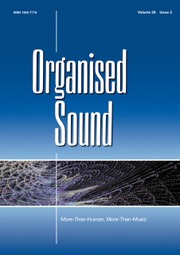Article contents
The ElectroAcoustic Resource Site (EARS): philosophy, foundation and aspirations
Published online by Cambridge University Press: 07 June 2004
Abstract
This paper introduces the ElectroAcoustic Resource Site project (EARS), taking a tripartite approach: first outlining the project's philosophy, then reporting on work-to-date and finishing with a discussion of the project's ambitions and aims.
The project's aim is the development of a dynamic, multi-lingual, international, publicly available Internet-based bibliographical resource designed to enhance the scholarly infrastructure of electroacoustic music studies, in particular, the musicology of electroacoustic music. Through the use of hypertext structures and linking systems the site will help to contextualise specific research within the broad field of electroacoustic music studies, as well as making helpful links between related areas/items of scholarship. The project aspires to assist access to current, past and evolving areas of scholarship and will attempt to redress certain imbalances in the ease of access to areas of research within the field. The project will strive to conceive of electroacoustic music in its widest possible sense, acknowledge the interdisciplinary nature of the field, and aspire to the greatest possible breadth and inclusiveness. The EARS project is coordinated by an international consortium, is directed by the authors and can be found at http://www.mti.dmu.ac.uk/EARS
- Type
- Research Article
- Information
- Copyright
- © Cambridge University Press 2004
- 1
- Cited by


